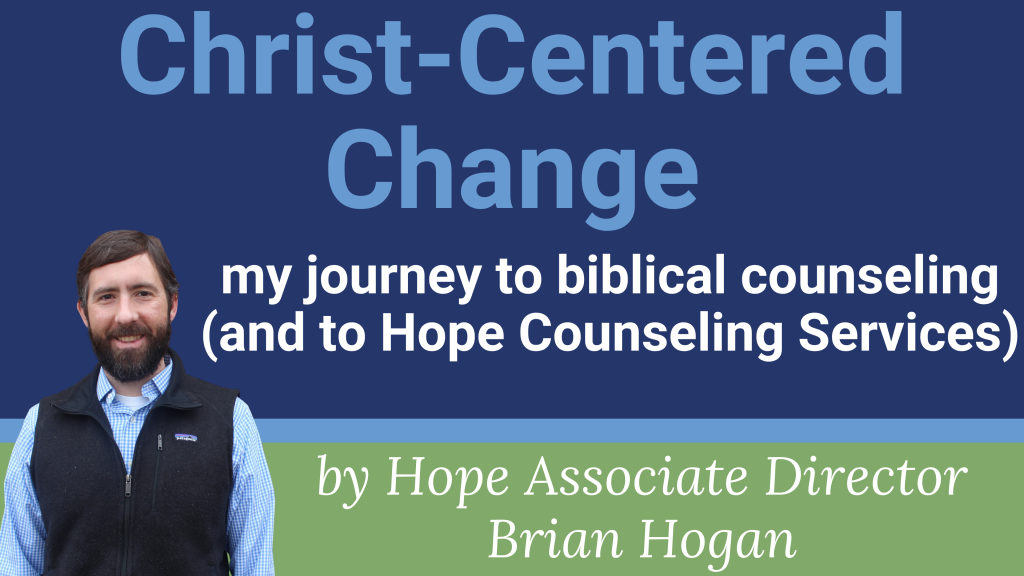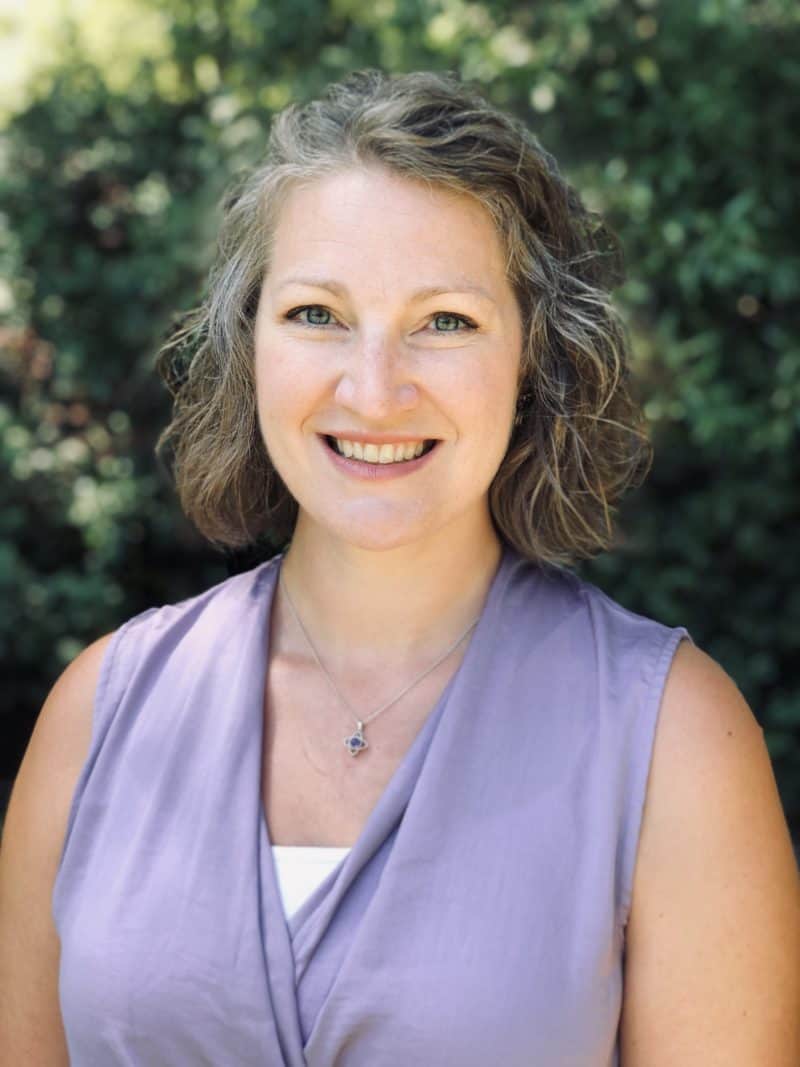I wanted to take this opportunity to introduce myself and share a little about what excites me about biblical counseling and my new role at Hope. While a Georgia native (Go DAWGS!), my family is moving to the Durham-Chapel Hill area from Dallas, TX. I am married to Simpson, a Texas native with a crush on the state of North Carolina since college. She is the wonderful mother to our three children. I am excited to be joining the team at Hope as we seek to help people see how Jesus meets them in their suffering and sin and calls them to new life in Him.
 My way to biblical counseling was not straight forward, and I must credit my wife for introducing me to it. When a spouse scholarship allowed me to take free classes at Westminster, she declared, “They are giving away free gold, and you are going to take some.” Little did we know the impact of this decision. It would reshape our lives and give us new direction. From just those two initial classes, we agreed to stay in Philadelphia so that I could pursue a Master of Divinity degree that concentrated in biblical counseling.
My way to biblical counseling was not straight forward, and I must credit my wife for introducing me to it. When a spouse scholarship allowed me to take free classes at Westminster, she declared, “They are giving away free gold, and you are going to take some.” Little did we know the impact of this decision. It would reshape our lives and give us new direction. From just those two initial classes, we agreed to stay in Philadelphia so that I could pursue a Master of Divinity degree that concentrated in biblical counseling.
Those two classes provided new lens to see the world out of which I was coming. Before moving to Philadelphia, I spent two years working in the southern deserts of Utah with at-risks teens as a field guide. We would spend eight days at a time with groups of teenagers living in the wilderness. This time served primarily as an intervention for them—a wake-up call that life was not working. It also sought to provide some initial life skills to help them live a healthier life upon returning home. A question from a student sticks in my mind to this day and became the catalyst for me pursuing biblical counseling.
He asked, “Why should I change?” At first glance, it would be easy to dismiss the question. It would be easy to think that the kid was being a jerk or defiant and resisting the program. In reality, it was an insightful question and it put me on my heels as I grasped for straws, struggling to answer the question—“Because your life will be better…”, “You will have a healthier life if you don’t smoke pot all the time…”, “You’ll have a better relationship with your parents…”, or “You will be more successful in life with a good job when you are older.” While all good things from a general perspective—motives that sounded right and good in my head, even I could hear how hollow they sounded as reasons for change as they came out of my mouth. What if he didn’t care for these things? What if he comes from an abusive situation and home was not actually a good place to be? What if he doesn’t want the corporate 9 to 5 life?
As I sat in my first biblical counseling class, it became clear to me what was lacking in that wilderness therapy model and, more broadly speaking, secular therapeutic models in general: they lack an objective reason for change. Change in these models is often based on subjective, self-referential motives—or the motives of the most powerful voice in an individual’s life. In the case of wilderness therapy for adolescents, that voice is often the parents imposing their desires for their children—not wrong in itself as parents are called to care for their children, but potentially challenging when core commitments do not align and there lacks a means to bridge the gap between those differences.
Biblical counseling offers a new vision of change. It does not simply offer tools for expressing emotions in healthy ways, nor does not seek to produce change by inducing guilt for the ways a teen’s behavior impacted his/her family. Biblical counseling offers a person—Christ. Christ flips the narrative of the change process. It moves from the pressure of all the things I ought to do to resting in the relationship with the one who says, “I see you. I hear your pain. I am with you. You are mine.” Rather than seeking to meet expectations imposed by self, family or culture, I am responding and empowered to change in response to the One who has loved me while I was still far off.
In short, the “mechanism” of change in biblical counseling is actually a person—Christ himself. As our understanding of him, our knowledge of him and his love for us grows, it then begins to change how we relate to God, to others, and to the world. And just as we are seen, heard, and pursued by God, we are able to move towards others in this same Christlike love.
Even before I had an understanding of biblical counseling, I saw this reality played out. I had one student in my wilderness program, who by all accounts, should have been a football star. He had a supportive family, he was athletic, and he was smart. So many things were going for this kid, but he was depressed—paralyzed by the expectations of those around him and overwhelmed by all the tasks he was supposed to do. In our group in the desert, he struggled to complete his daily tasks. One evening, I sat with him through this process. My main goal was to help him focus on one task at a time. That evening we successfully finished his tasks. His therapist later reported that that night had an impact on him. Yes, I gave him a helpful framework for completing tasks, but more importantly, I communicated to him as I sat in the dirt with him, “I see you. I hear your pain. I am with you.”
This is the beauty of the gospel lived out. This is why I am excited to be a part of Hope Counseling Services. As we seek to hold out practical ways of making change in people’s lives, we are rooting and embodying those tools in the love of the Father who says, “I see you. I hear your pain. I am with you. You are mine.” Change therefore happens not out of a list of commands but from a response to the love of the Father for his people.

 My way to biblical counseling was not straight forward, and I must credit my wife for introducing me to it. When a spouse scholarship allowed me to take free classes at Westminster, she declared, “They are giving away free gold, and you are going to take some.” Little did we know the impact of this decision. It would reshape our lives and give us new direction. From just those two initial classes, we agreed to stay in Philadelphia so that I could pursue a Master of Divinity degree that concentrated in biblical counseling.
My way to biblical counseling was not straight forward, and I must credit my wife for introducing me to it. When a spouse scholarship allowed me to take free classes at Westminster, she declared, “They are giving away free gold, and you are going to take some.” Little did we know the impact of this decision. It would reshape our lives and give us new direction. From just those two initial classes, we agreed to stay in Philadelphia so that I could pursue a Master of Divinity degree that concentrated in biblical counseling.